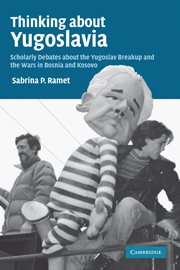 Thinking about Yugoslavia
Thinking about Yugoslavia Book contents
- Frontmatter
- Contents
- Preface
- List of books discussed
- Glossary
- 1 Debates about the war
- 2 The collapse of East European communism
- 3 The roots of the Yugoslav collapse
- 4 Who's to blame, and for what? Rival accounts of the war
- 5 Memoirs and autobiographies
- 6 The scourge of nationalism and the quest for harmony
- 7 Milošević's place in history
- 8 Dilemmas in post-Dayton Bosnia
- 9 Crisis in Kosovo/a (with Angelo Georgakis)
- 10 Debates about intervention
- 11 Lands and peoples: Bosnia, Croatia, Slovenia, Serbia
- 12 Southern republics: Macedonia and Montenegro in contemporary history
- 13 Conclusion: controversies, methodological disputes, and suggested reading
- Index
Preface
Published online by Cambridge University Press: 22 September 2009
- Frontmatter
- Contents
- Preface
- List of books discussed
- Glossary
- 1 Debates about the war
- 2 The collapse of East European communism
- 3 The roots of the Yugoslav collapse
- 4 Who's to blame, and for what? Rival accounts of the war
- 5 Memoirs and autobiographies
- 6 The scourge of nationalism and the quest for harmony
- 7 Milošević's place in history
- 8 Dilemmas in post-Dayton Bosnia
- 9 Crisis in Kosovo/a (with Angelo Georgakis)
- 10 Debates about intervention
- 11 Lands and peoples: Bosnia, Croatia, Slovenia, Serbia
- 12 Southern republics: Macedonia and Montenegro in contemporary history
- 13 Conclusion: controversies, methodological disputes, and suggested reading
- Index
Summary
I have been struck, over the years, by the persistence of certain debates – one could even say fault lines – within the scholarly community. These debates cover a wide range of subjects, riveting on the best methodology to study East-Central Europe, the nature of the collapse of the communist organizational monopoly (a collapse completely denied by one ‘imaginative’ scholar), the nature of the Bosnian War and the appropriate Western response, the nature of the war in Kosovo and the appropriate Western response, and the legitimacy of humanitarian intervention. But, while these debates might appear, at first sight, to be unrelated, it turns out, on closer inspection, that there are some threads running through these debates, and that in many one can identify traces of the rivalry between idealism (the belief that moral beliefs matter, that shifts in moral consensus can have political consequences, and that one can speak sensibly about universal moral norms and universal rights, with the corollary too that there are some duties incumbent upon the international community under certain conditions) and realism (the belief that what matter in the first place are stability and security, that these can be assured by means which are not necessarily moral in any sense, and that decisions taken by office-holders should be and, in fact, generally are taken on the basis of considerations of national interest, to be understood in terms of security, stability, wealth, power, and influence), or again between historical determinism which looks back over centuries to account for present developments and theoretical approaches which find the most relevant factors to be located in the more proximate past.
- Type
- Chapter
- Information
- Thinking about YugoslaviaScholarly Debates about the Yugoslav Breakup and the Wars in Bosnia and Kosovo, pp. viii - xPublisher: Cambridge University PressPrint publication year: 2005


